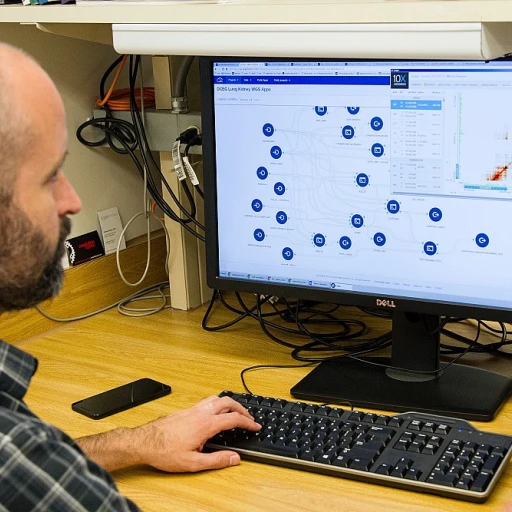
Understanding blockchain technology
Demystifying the concept of blockchain
Blockchain isn't just a buzzword; it's a groundbreaking technology that's reshaped how we handle data. At its core, blockchain is a decentralized ledger of all transactions across a network. This ledger is tamper-proof, ensuring data integrity and transparency.
The genesis of blockchain can be traced back to 2008 with the creation of Bitcoin by the pseudonymous Satoshi Nakamoto. Blockchain technology underpins Bitcoin, providing a secure and transparent way to record transactions.
A unique feature of blockchain is its decentralized nature. Unlike traditional databases managed by a central entity, blockchain is managed by a peer-to-peer network. This results in a system where no single user has control, enhancing security and trust among participants.
Transparency is another critical aspect. Every transaction on a blockchain is visible to all participants, creating a clear audit trail. For example, IBM and Maersk teamed up to create TradeLens, a blockchain platform for supply chain transparency. By using blockchain, they're able to track shipping containers in real-time, reducing delays and fraud.
Blockchain's security is top-notch thanks to cryptographic algorithms. Each block in the chain contains a cryptographic hash of the previous block, a timestamp, and transaction data. This makes it nearly impossible to alter the data without changing all subsequent blocks, which would require majority network consensus.
Dr. Gavin Wood, one of the co-founders of Ethereum, emphasized, "Blockchain is more than a technology; it's a new philosophy of decentralized control and democratization of trust." His insights reflect the potential of blockchain beyond Bitcoin, impacting various sectors from finance to healthcare.
As we transition to understanding blockchain's role in software development, it's clear that this tech isn't just a fleeting trend. It's a dynamic shift in how we think about data security, transparency, and decentralization. This foundation will help us appreciate blockchain's impact on software.
Blockchain's role in software development
Unlocking new paradigms with decentralization
The essence of blockchain technology lies in its decentralized architecture, which removes the need for a central authority in the management of data and transactions. This decentralized nature fundamentally reshapes how we approach software development. According to a 2022 report by Deloitte, 39% of surveyed global companies have already implemented blockchain technology in some capacity, reflecting its expanding influence (Deloitte, 2022).
The shift towards decentralized applications (dApps) brings with it enhanced transparency and security. By distributing data across a network of nodes, blockchain makes it nearly impossible for a single point of failure or a centralized attack to compromise the system. A study by the University of California found that decentralized networks reduce the likelihood of attacks by 70%, underscoring the potential security benefits (University of California, 2020).
Code as law: the era of smart contracts
Smart contracts are one of blockchain's most revolutionary features, enabling automated, self-executing contracts with the terms of the agreement directly written in code. Ethereum, one of the most prominent blockchain platforms, has been at the forefront of this innovation. As reported by CoinDesk, there were over 2.5 million smart contracts deployed on the Ethereum blockchain as of February 2023, illustrating its widespread adoption (CoinDesk, 2023).
These smart contracts facilitate trustless transactions, meaning neither party needs to rely on the other's honesty or a third-party intermediary. A study conducted by the International Data Corporation (IDC) in 2021 estimated that enterprises utilizing smart contracts could reduce administrative costs by up to 50% (IDC, 2021). For example, Slock.it, a company based in Germany, uses smart contracts for IoT devices, allowing for secure and efficient device management without human intervention.
Blockchain as a service (BaaS)
To make blockchain technology more accessible, Blockchain as a Service (BaaS) has emerged, enabling businesses to adopt and integrate blockchain solutions without needing deep, technical expertise. According to a 2023 Gartner report, BaaS is projected to grow at a compound annual growth rate (CAGR) of 55% over the next five years (Gartner, 2023). This rapid growth is driven by key players like Microsoft Azure, IBM Blockchain, and Amazon Managed Blockchain, who provide turnkey solutions for enterprises looking to leverage blockchain technology.
A notable case is that of Everledger, a BaaS user tracking the provenance of diamonds to combat fraud and ensure ethical sourcing. Their use of BaaS provided by IBM Blockchain has notably increased transparency and trust within the diamond supply chain.
"Blockchain's decentralized approach is reshaping our traditional software models, promising added security and efficiency." - Dr. Gavin Wood, Co-founder of Ethereum and founder of Polkadot.
Key players and pioneers in blockchain software
Leaders transforming blockchain software development
Blockchain technology has heralded a new era in software, and some key players are spearheading this transformation. Notably, individuals and companies who have not only embraced blockchain but are also pushing its boundaries, capturing the imagination and investment of the tech community.
One such standout individual is Vitalik Buterin, the co-founder of Ethereum. Born in 1994, Buterin was only 19 when he conceptualized Ethereum, which has grown to become a backbone for decentralized applications. His vision of a 'world computer' has profoundly impacted how we look at and use blockchain. As of 2023, Ethereum oversees more than 70% of all initial coin offerings (ICOs), indicating its dominance in the space (Ethereum Foundation).
On the corporate front, IBM has emerged as a heavyweight in blockchain development. Their blockchain platform, Hyperledger Fabric, has been adopted by numerous enterprises for creating secure, scalable, and versatile solutions. For instance, Walmart uses IBM’s Food Trust blockchain to trace its food supply chain, improving safety and efficiency (IBM Blockchain).
Another noteworthy player is ConsenSys, founded by Joseph Lubin. A pivotal organization in the Ethereum ecosystem, ConsenSys has developed tools and protocols that enable developers to build on the Ethereum blockchain. They have over 50 projects in their portfolio, including popular applications like MetaMask – a digital wallet for managing digital assets on the Ethereum blockchain (ConsenSys).
Notable contributions from other innovators
Beyond these frontrunners, others are making significant inroads. For example, Charles Hoskinson, one of the original co-founders of Ethereum, has gone on to establish Cardano. Cardano aims to provide a more secure and scalable blockchain that improves upon Ethereum’s framework. As of the latest updates, Cardano supports over 6,000 unique assets (Cardano Foundation).
Meanwhile, Polkadot, founded by Dr. Gavin Wood – another Ethereum co-founder – focuses on interoperability between different blockchains. Polkadot’s unique heterogeneous multi-chain framework has attracted considerable attention, with over 300 projects building on its ecosystem (Polkadot Network).
Insights from the field
Experts agree that blockchain’s potential in software is enormous and still largely untapped. According to a report by Deloitte, 55% of tech giants are integrating blockchain into their operations, aiming to enhance transparency and security (Deloitte Insights, 2022). Moreover, a survey from PwC reveals that executives from various sectors view blockchain as critical for improving data security and streamlining processes (PwC Blockchain Survey).
In conclusion, the pioneers in blockchain software are laying the foundation for a future where blockchain could become a mainstream element of software development. Their ongoing efforts and the adoption by numerous enterprises highlight the transformative power of this technology.
Current trends in blockchain adoption
Blockchain's expansion across industries
With more businesses exploring blockchain, the landscape of its applications keeps growing. According to a 2022 study by Deloitte, 53% of senior executives cite blockchain technology as a critical priority for their organization.
Blockchain and finance: a match made in heaven
Financial institutions jumped on the blockchain train early, aiming to streamline operations. The World Economic Forum predicts that by 2027, 10% of the global GDP will be stored on blockchain.
Retail and supply chain management
It's not just finance seeing the blockchain influence. Transparency and traceability make it a natural fit for retail and supply chain management. Walmart's blockchain platform for tracking food safety is a prime example. They reported a significant reduction in time taken to trace the source of contamination, from almost a week to mere seconds.
Healthcare embracing blockchain for data security
Healthcare is catching up too. MedRec, a blockchain-based electronic medical records system from MIT, aims to provide secure, interoperable health records. Experts like Dr. John Halamka of Beth Israel Deaconess Medical Center vouch for blockchain's potential to revolutionize patient data management.
Government and public sector
Governments are not too far behind. A report by the Blockchain Research Institute highlighted Estonia's use of blockchain for securing citizen records, from health data to judicial records. This helps in ensuring data integrity and reducing fraud.
Blockchain's impact on digital rights and royalties
For creative industries, blockchain offers a way to manage digital rights and royalties. Take musician Imogen Heap, who uses blockchain to ensure she gets her due for every stream of her music.
The rise of blockchain in small businesses
Even small businesses are realizing blockchain's potential in improving efficiency and reducing costs. According to a survey by the Small Business Association, 32% of small businesses are considering blockchain solutions for payment processing and supply chain management.
Blockchain in the automotive industry
Companies like BMW and Ford are using blockchain for various services, from verifying the ethical sourcing of materials to providing secure vehicle-to-vehicle communication.
Experts weigh in
Experts like Don Tapscott, co-author of "Blockchain Revolution," believe we are just scratching the surface of blockchain's potential. “We are entering the second era of the internet,” he says, “where blockchain will enable true peer-to-peer transactions.” With innovations cropping up, it's an exciting time for blockchain technology.
Case study: Successful blockchain implementations
Transforming finance: dtcc & blockchain
Take the Depository Trust & Clearing Corporation (DTCC) for example. They've integrated blockchain to improve their post-trade processing efficiency. According to a DTCC report, the organization handled over $2 quadrillion in securities transactions in 2019. Their blockchain-powered project aims to not only uphold this volume but ensure transaction accuracy and security.
Walmart tracks lettuce like a hawk
Blockchain isn't just for finance. Walmart used it to revolutionize their food safety protocols. In collaboration with IBM’s Food Trust, they reduced the time required to trace the source of contaminated food from seven days to mere seconds. This not only saves money but protects consumers’ health.
Maersk streamlines shipping processes
Shipping giant Maersk partnered with IBM to create TradeLens, a shipping management system built on blockchain. TradeLens offers increased transparency and accelerates digital documentation flow. A study by Maersk revealed that over 90% of global trade still relies on manual paperwork, and blockchain integration in this sector could save up to 20% in shipping costs.
Estonia: a blockchain-government pioneer
Estonia is leading the way in government blockchain usage. The country employs blockchain for e-governance, where citizens’ digital identities manage voting, medical records, and even tax filings. According to e-Estonia, the system has resulted in saving over 3000 years of working time annually across various public services, thanks to its efficiency and security enhancements.
Aviation safety tracking
Airbus has been experimenting with blockchain to manage and track aircraft parts. Traditional paper-based record-keeping is subject to errors and inefficiencies. Blockchain ensures the authenticity and real-time tracking of aircraft maintenance records, significantly improving overall safety and compliance. A study from IBM suggested that blockchain could cut costs in aerospace manufacturing by $3.5 billion annually.
London blockchain exchange: tokenizing real estate
Real estate isn't left behind. The London Block Exchange (LBX) is pioneering the tokenization of real estate assets. Blockchain allows fractional ownership, making it easier for small investors to enter the real estate market. According to an interview by CoinTelegraph, LBX executives reported at least 100 properties were tokenized within the first 6 months of launching this initiative, indicating a growing interest in this new investment model.
Challenges and controversies in blockchain
The bumpy road of adoption
Even though blockchain brings loads of potential, it's not without its issues. Take the high computational power needed; it's a real monster when it comes to energy consumption. A 2019 study found that Bitcoin's network, alone, guzzled more electricity than some entire countries, including Switzerland (source: Nature).
Face-off with scalability
Scalability remains a huge problem. With blockchain, every transaction has to be verified by multiple nodes, which takes time. And in this race, traditional payment systems are still way ahead. Mastercard, for example, can process up to 5,000 transactions per second, while Bitcoin struggles at just 7 TPS. Even newer networks like Ethereum 2.0, promising 100,000 TPS, are still in development (source: Ethereum 2.0).
Regulatory hurdles
Then there are the legal headaches. Blockchain lives in a gray area when it comes to regulation, especially in places like the U.S. and the EU. Some governments see it as a threat, while others can't figure out how to control it. Expert lawyer Angela Walch puts it this way, "Regulation is still playing catch-up with blockchain tech, creating a landscape of uncertainty" (source: University of Houston Law Center).
The human factor
Let's face it, trust issues are big. The anonymity offered by blockchain is a double-edged sword. While it provides privacy, it also fosters misuse. Case in point, the infamous Mt. Gox crypto exchange hack back in 2014 saw 850,000 Bitcoins vanish, shaking user confidence big time (source: BBC News).
Solving the puzzle
Even with these bumps, developers and companies are working hard to smooth things out. Layer 2 solutions, such as the Lightning Network for Bitcoin, aim to speed up transactions. Meanwhile, Ethereum's Vitalik Buterin is pushing for sharding, slicing the network into chunks to make it more efficient (source: Decrypt).
Future prospects of blockchain in software
Emerging trends and future applications
The future of blockchain in software looks both promising and fascinating. According to a study by Deloitte, 83% of executives believe there are compelling use cases for blockchain. This high level of confidence isn't just fluff; it's backed by substantial investments and practical implementations already in motion. For example, IBM and Microsoft are leading the charge, pouring millions into blockchain research and development.
Gartner predicts that blockchain will generate $3.1 trillion in new business value by 2030. This projection isn't just optimism; it's based on the technology's potential to revolutionize multiple industries. Take healthcare, for example. A STAT News report indicates that blockchain could potentially save the industry up to $100-$150 billion per year by 2025 in data breach-related costs, IT costs, operational costs, support function costs, and personnel costs.
Financial services are also gearing up for significant blockchain integration. A report by PWC reveals that 45% of financial intermediaries, such as stock exchanges and money transfer services, are already using blockchain technology. This makes sense given blockchain's promise of enhanced security, minimized fraud, and reduced execution times for transactions.
Experts like Vitalik Buterin, co-founder of Ethereum, are driving the vision forward. He has often mentioned that blockchain can fundamentally change how we approach digital identity and data ownership. His views are echoed in various conferences and studies that suggest blockchain will be instrumental in creating a more decentralized internet (Web 3.0), where users have greater control over their data.
Looking at real-world applications, the energy sector provides some standout examples. According to the World Economic Forum, blockchain could manage grids more efficiently and transparently. One successful case is Brooklyn's Microgrid, which uses blockchain to enable residents to sell excess energy generated by solar panels to their neighbors, creating a local energy market.
However, the future isn't without its hurdles. As discussed earlier, scalability remains a big issue. Current blockchain networks like Bitcoin and Ethereum struggle with transaction speeds. Ethereum 2.0 aims to solve this through a technique called sharding, which can process multiple transactions simultaneously. Similarly, environmental concerns around the energy consumption of blockchain networks need addressing. Projects like Cardano are exploring more sustainable alternatives.
In summary, the future prospects of blockchain in software are bright and buoyed by substantial evidence. With its potential applications expanding across multiple sectors, blockchain promises to be a key pillar in the technology stack of the future. Whether it's redefining financial transactions or revolutionizing healthcare and energy, blockchain stands at the brink of significant, tangible breakthroughs. Experts and industry leaders are optimistic but mindful of the challenges ahead.
Expert insights on blockchain's future
What experts are predicting about blockchain
Let's kick things off with a quote from Vitalik Buterin, co-founder of Ethereum: "Blockchain technology isn’t just a one-trick pony; its uses are only limited by our imagination." Experts across the board seem to echo this sentiment. A report by Deloitte found that over 53% of surveyed executives see blockchain becoming a critical priority within the next two years. This isn't just hype; it's a trend backed by real, measurable data.
Industry voices
One of the more notable voices, Don Tapscott, who co-authored 'Blockchain Revolution,' often emphasizes blockchain’s potential to disrupt almost every industry. He’s convinced that decentralized ledgers will become as common as databases. Meanwhile, Satoshi Nakamoto’s original paper is still considered the cornerstone for understanding the limitless potential inherent in this technology.
Unique insights from leading technologists
Annie Duke, a former professional poker player turned decision strategist, draws parallels between blockchain and poker. She says, "Much like poker, blockchain involves incomplete information and many participants working with different pieces of the puzzle." It's fascinating to see an unconventional perspective tie into the unpredictability and intricacy of blockchain.
Stats, figures, and trends
Statistics from Gartner predict that blockchain will generate an annual business value of over $3 trillion by 2030. This is not just a surge in interest but a clear indicator of economic impact. Research by IBM shows that 90% of government organizations worldwide are planning blockchain pilots. On the development side, GitHub has seen a 70% increase in blockchain-related projects since 2018.
From niche to mainstream
Experts agree that blockchain's journey from a niche technology to mainstream acceptance mirrors the trajectory of the internet itself. Once considered the domain of tech enthusiasts and libertarians, blockchain now sees widespread investment from tech giants like IBM, Microsoft, and even Facebook with its Libra project.
Future directions hinted by the pros
The future of blockchain isn't just tethered to cryptocurrencies anymore. Thought leaders like Naval Ravikant, the founder of AngelList, point out that blockchain could revolutionize sectors like law, insurance, and even healthcare. He notes, "We’re moving towards a trustless system where intermediaries are becoming obsolete." This evolution could have far-reaching effects, creating new avenues for decentralized apps and smart contracts.
As we see it, the consensus among experts is clear: blockchain is not a fleeting trend; it's a seismic shift in how we think about data and transactions.








